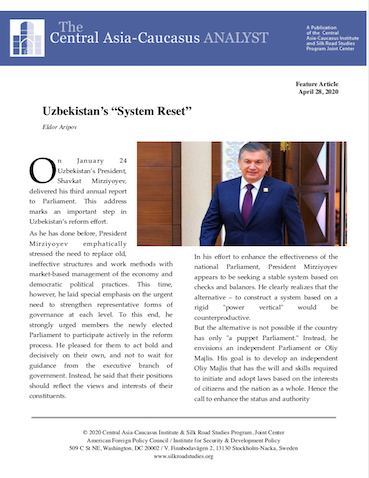Uzbekistan's "System Reset"
Uzbekistan's "System Reset"
By: Eldor Aripov
On January 24 Uzbekistan’s President, Shavkat Mirziyoyev, delivered his third annual report to Parliament. This address marks an important step in Uzbekistan’s reform effort.
As he has done before, President Mirziyoyev emphatically stressed the need to replace old, ineffective structures and work methods with market-based management of the economy and democratic political practices. This time, however, he laid special emphasis on the urgent need to strengthen representative forms of governance at each level. To this end, he strongly urged members the newly elected Parliament to participate actively in the reform process. He pleased for them to act bold and decisively on their own, and not to wait for guidance from the executive branch
of government. Instead, he said that their positions should reflect the views and interests of their constituents.
In his effort to enhance the effectiveness of the national Parliament, President Mirziyoyev appears to be seeking a stable system based on checks and balances. He clearly realizes that the alternative – to construct a system based on a rigid "power vertical" would be counterproductive.
But the alternative is not possible if the country has only "a puppet Parliament." Instead, he envisions an independent Parliament or Oliy Majlis. His goal is to develop an independent Oliy Majlis that has the will and skills required to initiate and adopt laws based on the interests of citizens and the nation as a whole. Hence the call to enhance the status and authority
of parliamentarians. To this end, also, he sharply broke with tradition by proposing a law that will oblige ministers to respond personally to requests from members of parliament.
Political Turbulence in Georgia One Year Before Elections
By Natalia Konarzewska
September 16, 2019, the CACI Analyst
One year ahead of the 2020 parliamentary elections, Georgia is experiencing a serious political crisis that has exposed deep flaws in the rule of Georgian Dream (GD) and its illusive reconciliation with Russia. The visit of a Russian lawmaker to Georgia’s Parliament in June sparked outrage across the country and fueled widespread disappointment with the ruling party’s policies. The parliamentary scandal delivered a serious blow to the government’s approval ratings and its hallmark policy of rapprochement with Russia. This is a worrying trend for the ruling party, which is seeking a third consecutive term but increasingly compromises democratic principles in order to stay in power.

Georgia's Far Right and Mainstream Politics: Lessons from the EU
By Tomáš Baranec
August 28, 2018, the CACI Analyst
In mid-May, Tbilisi once again witnessed mass demonstrations led by various liberal groups. This time the unrest was fueled by a harsh police operation against alleged drug trafficking in two popular clubs in Tbilisi: Café Gallery and Bassiani. An otherwise quite common sight in the Georgian capital was dramatized by a massive opposing rally led by several Georgian far-right groups. Although not the first such demonstration, this rally seemingly initiated a process of consolidation and unification of Georgia’s political far-right. This process could lead to a rise of far-right, nativist and anti-EU narratives in Georgia’s political mainstream.




